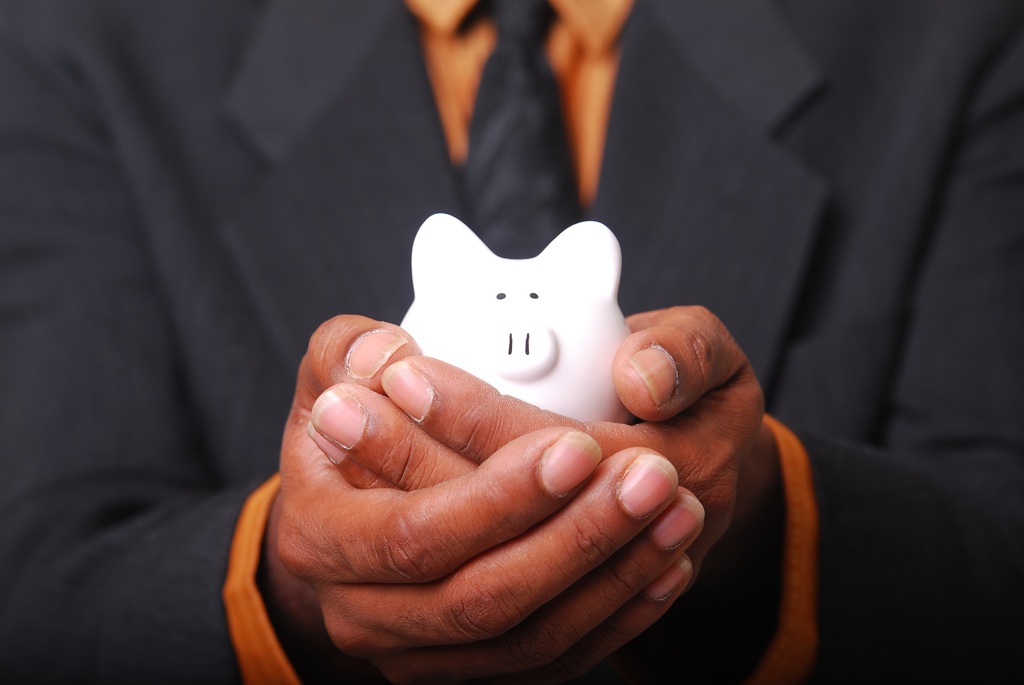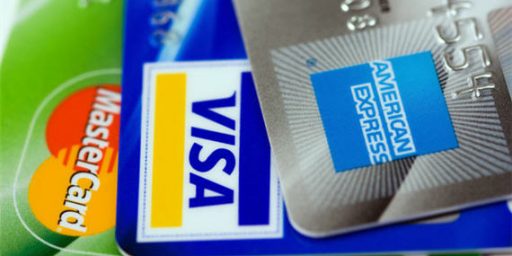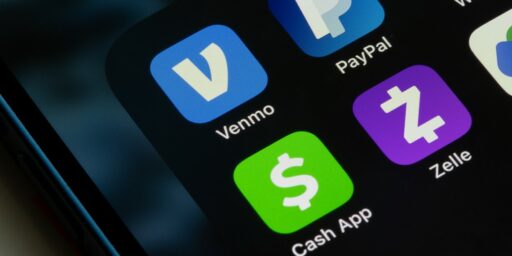Biden Proposes Limiting Overdraft Fees to $3
A well-meaning concept with obvious pitfalls.

AP (“Overdraft fees could drop to as low as $3 under new Biden proposal“):
The cost to overdraw a bank account could drop to as little as $3 under a proposal announced by the White House, the latest effort by the Biden administration to combat fees it says pose an unnecessary burden on American consumers, particularly those living paycheck to paycheck.
The change could potentially eliminate billions of dollars in fee revenue for the nation’s biggest banks, which were gearing up for a battle even before Wednesday’s announcement. Exactly how much revenue depends on which version of the new regulation is adopted.
Banks charge a customer an overdraft fee if their bank account balance falls below zero. Overdraft started as a courtesy offered to some customers when paper checks used to take days to clear, but proliferated thanks to the growing popularity of debit cards.
“For too long, some banks have charged exorbitant overdraft fees — sometimes $30 or more — that often hit the most vulnerable Americans the hardest, all while banks pad their bottom lines,” President Joe Biden said in a statement. “Banks call it a service — I call it exploitation.”
Under the proposed rule, banks could only charge customers what it would cost them to break even on providing overdraft services. This would require banks to show the CFPB the costs.
Alternatively, banks could use a benchmark fee that would apply across all affected financial institutions. Regulators proposed several fees — $3, $6, $7 and $14 — and will gather industry and public input on the most appropriate amount. The CFPB says it arrived at these figures by looking at how much it cost banks to recoup losses from accounts that went negative and were never paid back.
According to research conducted by Bankrate last August, the average overdraft fee was $26.61. Some banks charge as much as $39. The nation’s biggest banks still take in roughly $8 billion in overdraft fees every year, according to data from the CFPB and banks’ public records.
Biden has made the elimination of “junk fees” one of the cornerstones of his administration’s economic agenda heading into the 2024 election. Overdraft fees have been at the center of that campaign, and the White House directed government regulators last year to do whatever is in their power to further curtail the practice.
“We are proposing rules to close a longstanding loophole that allowed many large banks to transform overdraft into a massive junk fee harvesting machine,” said Rohit Chopra, director of the Consumer Financial Protection Bureau, in a prepared statement to reporters.
In theory, at least, this seems reasonable. Charging someone $39 for a simple mistake seems egregious, especially since those most likely to overdraw their accounts are those living on the margins.
But the second-order effects here seem rather obvious. These same customers are otherwise the least profitable. If someone keeps a balance under $500 in their account, the bank isn’t exactly making a fortune on interest loaning out their money. And, if they overdraw their accounts, merely breaking even on the extra work this creates for the bank hardly seems worth it.
So, won’t the people who Biden is trying to protect simply wind up unbanked?
This, on the other hand, seems like a more obvious route:
Banks could also provide small lines of credit to allow customers to overdraft, a service that would operate like a credit card. Some banks like Truist Bank currently offer that type of service.
Here, a small error in overdrafting would probably still cost the customer something like $3 but a larger overdraft would cost more. But it would presumably be a preferably alternative to bouncing the check.






Overdraft fees take advantage of the poor, the elderly and financially ignorant. Even people with decent jobs can fall into the trap if the timing is off. My mother was constantly racking them up after she retired because she kept forgetting she was getting only one paycheck per month instead of weekly. It was a good-sized check but after 7 $35 fees, she was in the red more often then not. I can’t tell you how often I had to go down to the local branch to have the fees removed. I finally got them to them to remove the ability to go over on the account (something they VERY much didn’t want to do); when she complained about possibly bouncing checks, I told her I’d give her $250 on the last week of the month as needed and she could give it back once she was sure she was in the black. Never did get any of it back but worth it to not have to fight with the tellers on a regular basis…….
$250 for a check being delayed a week seems grossly unfair, especially to a senior who worked hard all their lives. Her account wasn’t small but it was fluid – she was only a “non-profitable” customer for 7 or less days a month due to SS and pension check schedules. $3 would have been an improvement but wouldn’t solve the problem. If overdraft must exist, it should only kick in after a grace period of 2-3 non-chargeable days minimum because the check could literally still be in the mail.
@KM: Again, I agree with the idea we shouldn’t hit vulnerable people with exorbitant fees. But it’s not the bank’s fault if a customer can’t manage their money, either.
When life demands that everything runs through a bank, banks become a public service like phone companies. If we have to bail out banks for bad investments they shouldn’t get to complain they don’t make enough money on people who are forced to use their services.
What are people’s thoughts on postal banking?
@Stormy Dragon: From what I could tell, it worked well in Korea.
A number of banks have already introduced new banking products for the unbanked/underbanked, which don’t have fees. They are more narrow accounts, with fewer features–but that’s how they make it work.
Banks should absolutely not be charging $25 – $40 for an overdraft. This gets back to one of my standard sayings: If you don’t want to be a heavily regulated business, don’t act like you need to be a heavily regulated business.
The other thing banks do which annoys me considerably is treating lines of credit like bank accounts when presenting your status on screen. No, it isn’t a bank account with $18,500 in it. It’s a HELOC and I’m waiting until you close the bloody thing down.
I just got into a mess of confusion because I had misconstrued an overdraft account as a separate account with actual money in it. Blargh.
@James Joyner:
True but it’s also not the customer’s responsibility to be “adequately” profitable to a corporation. $1 extra is a profit, just not a great one. Banks do not have the right to expect you to always be a net positive because that’s not how customer service or business works. There’s always going to be loss – the question is does the bank have the right to pass that along to you or be made to accept it as the cost of doing business? Do they have the right to expect you to make them X amount of money before they bother to engage in a socially-crucial necessity with you?
Do you know how much effort it takes the computer to manage 10,000 accounts in the red by a few bucks? The same as if the 10,000 were in the black. Let’s be real here – no human is tracking this and doing the work. An extra line or two of code that’s already been written and implemented decades ago is doing it so banks can’t complain about “extra work”. It’s work they choose to do to monitor a situation and they decide to pass the cost on to you. It’s not costing them money in work, effort or time. Your only worth is the regular penalty and the low-amount fees. The whole point is to scam it out of them that way so it’s inherently fraudulent and predatory.
Also there’s a huge classist element to “you need to have X amount to have a bank account” that’s going to get even worse as late-stage capitalism drains us all. That X is gonna keep going up because hey, if they can make their money off the ever-richer millionaires and billionaires, what do they need the working class for? Again, the money comes from low-amount fees and penalties so there needs to be an underclass to fund it. $500 today can become $5,000 tomorrow to increase that fee base. Add in the truth that more people are working class then they want to admit, and you’ve got a recipe for economic disaster. Paycheck to paycheck means having some money left after all the expenses and makes you middle class. Having none or having to cut things to get to the next check makes you working classes since you’re working to get the money to live. Most Americans are working class and fees are trap that can snare them when vulnerable.
@KM:
I’m going to push back on this ever so slightly, because while the effort on the part of the *computer* is the same, there are notification processes that kick in (Regulation E) when an account goes in the red that do require additional work. An overdrawn account does cost the bank more than an account in good standing.
@Jen:
Fair enough but how much work is it really, especially in an increasingly AI and computer run world?
Is there required human intervention or just an additional piece of computer-generated standard output? If it’s a computer-generated form, it’s maybe a couple of cents worth of electricity to do en mass for the day. The $3 fee for one person would cover an entire branch’s reporting alone. The bank could charge them the kilowatt hour fee of the local electricity supplier for the minute or less it takes to create and transmit the report then as the fee; hell you could double it and it wouldn’t make it to $3 an overdraft. Hawaii has the highest average electricity rate of 42.69 cents per kilowatt-hour so one hour for one transaction wouldn’t be a buck. The “labor” part is where they’re justifying large amounts and it’s BS. $1 is the highest it should be because that’s going beyond recouping costs to break even and actively generating profit per overdraft.
@Jen:
@KM:
Think of change fees on airlines.
It’s a far more complex matter, as some late changes may render a seat empty for a given flight. But the overall cost for changing the day or time for a flight ought to be low. Still airlines charge varying amounts that go from sensible to outrageous.
Also, lots of people pay change fees without ever making any schedule changes. How so? By buying a fare that includes changes. These fares costs more, and in fairness often include other ancillary services like checked bags or a better seat.
The one clear indication I have that change fees cost airlines little overall, is the fact that Southwest, a low cost airline, doesn’t charge any change fees at all.
Does this… or have they already… addressed the issue of banks goosing the posting order of transactions to rack up multiple overdraft fees if possible? If I recall, banks would routinely wait until they end of the day to process these fees and if it was advantageous for them to post them out of order so that more charges were “overdrafts”, they’d do so.
For example, if you had $100 in your account and made 8 $10 purchases (bringing your balance to $20) and then, after all that, one $100 purchase (therefore overdrafting your account), they’d post the $100 transaction first so the other 8 all get dinged as overdrafts.
Was that corrected previously? Or does this do anything about that?
@Kazzy: I think that varies by institution. Some process transactions as they come in (real time posting) but most do batch transactions (end of day).
I don’t know if it’s a regulation or if banks just got so much crap (deservedly) for doing the charges first, then the credits, but I do know that the bank we use for most of our banking does batch transactions, but posts all credits first, then debits. I also have some accounts at USAA and I believe they use real-time posting–at least for credits.
@KM: As Kathy notes, it’s complex. A massive bank like BofA will have very different expenses than a regional or community bank, or a credit union. Part of it is labor, but mostly the issue is that overdrafts change all sorts of calculations. Not really relevant to the discussion here, but I can give one example: one bank regulation stipulates that a deposit account cannot have more than a handful of transactions per month.* So, if you have your bank checking account set to use a savings account as a protection against overdrafts, each time the bank hits your savings account, that counts as a transaction. If that exceeds (I think) six, the bank is required to convert that savings account into a checking account. Why? Because this goes to how much the bank can report as reserve funds (banks are required to hold reserves). So, if a customer routinely overdraws their checking account in this situation, they will likely have the savings account automatically switch over to a checking account…and that results in all kinds of customer service time and attempts to fix the account.
TL; DR: banking regulations are messy and impact customers in all kinds of ways.
*This was actually changed during the pandemic to remove the transaction limits, because people were accessing savings and didn’t realize they would get dinged for this, but I don’t know if it was a temporary change, or if it’s been made permanent.
@KM: The issues are not simply computing but Bank Regulation. If one does not actually understand the complex range bank regulations requirements then making opinions as to how easy it is from a supposed programming PoV are rather empty.
Regulatory reporting to the US regulators does in fact have human collation requirements and there are in addition relative to various accounts, actual provisions that have historically been required. A superficial computer programming analysis of the internal bank costing is fallacious from a to z.
Regardless the general policy issue should rather be resolved with a Postal Banking and/or a basic account provision obligation in connection with deposit insurance access. This is how other markets address low-income banking. There are quite a set of international examples to draw on (and likely historical USA for that matter of past policy)
A generalised restriction is bad policy.
As detailed in this official government website, overdraft protection is entirely voluntary, and no one is obligated to take it and pay the resulting overdraft fees.
It’s always surprising to me how many people don’t know this. In my younger years, this is exactly what I ended up doing to help force myself to learn to budget and control my spending.
I’m fine with some additional regulations in this area to avoid exploitation and cap the fee amount to something reasonable, but I’m not sure $3 is it. But I’d also like to see a regulation to make opting out the default status when opening a new account, or requiring banks to remove the overdraft feature from accounts that use it too frequently. Of course, those would piss the banks off even more than capping fees.
The government (and everyone else) ought to also do more to make vulnerable and financially ignorant people aware that overdraft is an optional service that is probably – on net – bad for most people. It can be thought of not as overdraft “protection,” but as the ability to take on short-term and very expensive loans.
@Lounsbury: Bank regulations, like most other regulatory work the government does, are written in the blood of its previous victims.
As @Jen said, if they don’t want to be over-regulated, don’t act like they need to be over-regulated.
There ‘s also a lot of places where people can’t get bank accounts at all, due to being homeless, or being unable to prove their identities, or whatever. Which means ridiculously expensive methods are used when these people want to turn earned/awarded money into actual purchasing power.
@James Joyner:
Wow.
I’m curious James, how much time have you spent around people who are actually poor?
It’s not American taxpayers’ fault that bankers can’t manage risk. Yet banks keep running to us for bailouts when they mismanage money.
Boo hoo to these greedy, glorified welfare queens.
@James Joyner: “But it’s not the bank’s fault if a customer can’t manage their money, either.”
Is it their fault if they choose to charge outrageous fees and make huge profits off their poorest customers?
@Lounsbury: “If one does not actually understand the complex range bank regulations requirements then making opinions as to how easy it is from a supposed programming PoV are rather empty.”
This has been your weekly reminder that only Lounsbury is wise enough to comment on any issue, and the rest of you have the right to share his opinions only.
I miss when corporations were required to at least ostensibly serve a public interest rather than just a shareholder interest. I guess that went away before I was born, but I miss the idea of it.
I would make offering the basic accounts to anyone simply entry stakes to doing any business as a bank.
I would be a relatively benevolent dictator.
We need the equivalent of postal banks. Considering the importance of banking to modern life, we really do need a no-frills bank offering service to everyone.
@Grumpy realist:
There isn’t a lack of access to banking services in this country, even for poor people. Even people who have a history of abusing the system or can’t get a normal account at a regular institution due to very bad fortune can get a basic second chance account or a prepaid debit account.
And then there are credit unions, which are nonprofits, and also a variety of nonprofit banks.
It’s not clear to me what services a postal bank or the other ideas floated here would provide that all the other current nonprofit banking options do not
@Andy: unfortunately those “prepaid debit cards” often also charge already poor people fees to access their cash.
Also, in a lot of places we don’t have credit unions. As long as we insist that the postal service deliver and pick up from everywhere, including places out in the middle of nowhere, I don’t see why we shouldn’t insist the same access right be provided for no-frills banking services.
@DK:
You may be the first person who’s ever said this. Well done!! 😛 😛 😛
@anjin-san: Everybody believes they’ve experienced poverty/economic hardship. Remember that no less than Ann Romney talked about their salad days in grad school when Mitt had to sell part of his stock portfolio so they could by a coop near the school. Everybody imagines they’ve been poor. Some of you even have been.